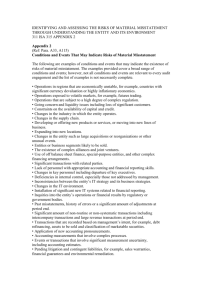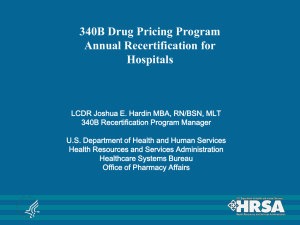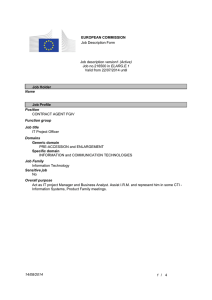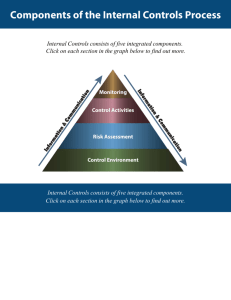David S. Ivill, Partner Emily J. Cook, Partner Joseph M. Parise
advertisement
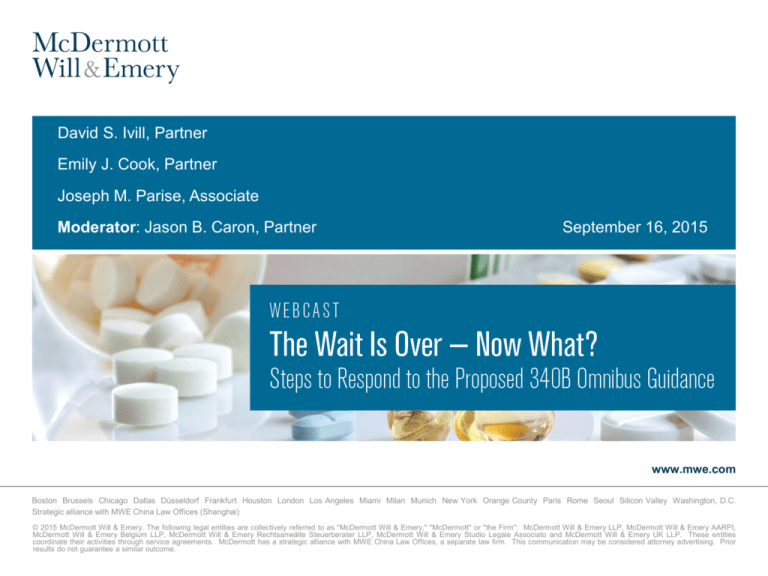
David S. Ivill, Partner Emily J. Cook, Partner Joseph M. Parise, Associate Moderator: Jason B. Caron, Partner September 16, 2015 www.mwe.com Boston Brussels Chicago Dallas Düsseldorf Frankfurt Houston London Los Angeles Miami Milan Munich New York Orange County Paris Rome Seoul Silicon Valley Washington, D.C. Strategic alliance with MWE China Law Offices (Shanghai) © 2015 McDermott Will & Emery. The following legal entities are collectively referred to as "McDermott Will & Emery," "McDermott" or "the Firm": McDermott Will & Emery LLP, McDermott Will & Emery AARPI, McDermott Will & Emery Belgium LLP, McDermott Will & Emery Rechtsanwälte Steuerberater LLP, McDermott Will & Emery Studio Legale Associato and McDermott Will & Emery UK LLP. These entities coordinate their activities through service agreements. McDermott has a strategic alliance with MWE China Law Offices, a separate law firm. This communication may be considered attorney advertising. Prior results do not guarantee a similar outcome. Overview Introduction to the 340B Program Procedural History of the Proposed Omnibus Guidance Key Takeaways – Current HRSA Guidance v. Proposed Guidance – Definition of Patient – Definition of Covered Outpatient Drug – Compliance with GPO Prohibition – Auditable Records – Dispensing to Medicaid Managed Care Patients – Contract Pharmacy Oversight Other Key Issues Action Steps Questions 2 Intro to the 340B Program Created by federal statute in 1992 and codified at Section 340B of the Public Health Service Act (42 U.S.C. 256b) Establishes a ceiling price on “covered outpatient drugs” Discounted drugs are available to eligible “covered entities” for dispensing to eligible “patients” Drug manufacturers that sign Pharmaceutical Pricing Agreements with Medicaid are required to offer discounted drugs to covered entities 3 Procedural History of Omnibus Guidance Recognizing need for further clarity of 340B Program requirements, HRSA proposed issuing a “mega-regulation” covering a multitude of topics April 2014 – HRSA submits the “mega-regulation” to OMB May 2014 – An unrelated federal court decision restricts the scope of HRSA’s authority to issue notice-and-comment rules November 2014 – In light of the decision, HRSA withdraws the “mega-regulation” from OMB August 2015 – HRSA publishes the Omnibus Guidance HRSA is accepting comments on the Omnibus Guidance until October 27, 2015 4 Key Takeaways: Definition of “Patient” Drugs purchased at 340B prices may only be dispensed to eligible “patients” of the covered entity Current Definition of “Patient” (finalized in 1996) – The covered entity has established a relationship with the individual, such that the covered entity maintains records of the individual’s health care – The individual receives health care services from a health care professional who is either employed by the covered entity or provides health care under contractual or other arrangements (e.g., referral for consultation) such that the responsibility for the care provided remains with the covered entity – The individual receives a health care service or range of services from the covered entity that is consistent with the service or range of services for which grant funding or federally qualified health center lookalike status has been provided to the entity (Does not apply to hospitals) 5 Key Takeaways: Definition of “Patient” Proposed Definition of “Patient” 1. The individual receives a health care service at a covered entity site that is registered for the 340B Program and listed on the public 340B Database 2. Individual that sees a physician in the physician’s private practice, which is not listed on the 340B Database, would not be eligible to receive 340B drugs – including any referral or follow up care from the covered entity The individual receives a health care service from a health care provider who (i) is employed by the covered entity or (ii) is an independent contractor of the covered entity such that the covered entity may bill for services on behalf of the provider Privileges or credentials at a covered entity are not sufficient If a patient is referred from the covered entity to an outside provider, and receives a prescription from that outside provider, the prescription would not be 340B-eligible Question as to what “may bill for services on behalf of the provider” actually means 6 Key Takeaways: Definition of “Patient” Proposed Definition of “Patient” (cont.) 3. 4. An individual receives a drug that is ordered or prescribed by the covered entity provider as a result of the service described in 2 An individual will not be considered a patient of the covered entity if the only health care received by the individual from the covered entity is the infusion of a drug or the dispensing of a drug Telemedicine is acceptable The individual is classified as an outpatient when the drug is ordered or prescribed The patient’s classification status is determined by how the services for the patient are billed to the insurer An individual who is self-pay, uninsured or whose cost of care is covered by the covered entity will be considered a patient if the covered entity has clearly defined policies and procedures that it follows to classify such individuals consistently 7 Key Takeaways: Definition of “Patient” Proposed Definition of “Patient” (cont.) 5. The individual has a relationship with the covered entity such that the covered entity maintains access to auditable health care records 6. Records demonstrate that the covered entity has a provider-to-patient relationship and the responsibility for care is with the covered entity For grantees, the individual receives a health care service that is consistent with the covered entity’s scope of grant, project or contract Applies to each child site of the covered entity 8 Key Takeaways: Definition of “Patient” Key Differences – Tightens the nexus between the care provided at the covered entity and the prescription written – Limits the practitioners who may write 340B-eligible prescriptions – Ties eligibility of a prescription to a service for which the covered entity could bill the patient or a third party payor as a “covered outpatient service” Practical Implications – Visits at private physician offices are not eligible (even if such visits are for follow-up care) Provider must be employed by, or an independent contractor of, covered entity. Proposed guidance removes the “other arrangement” language – Inpatient v. outpatient status determinations render the use of physical inventories impractical – Covered entity and each child site must be able to provide both 340B and non-340B drugs – Infusion services prescriptions written by a community provider not employed by or under contract with the covered entity are ineligible – The 340B infusion drug must be written as a result of a covered entity provider-to-patient encounter 340B Program is not a general employee pharmacy benefit - an employee of a covered entity is not eligible based solely on his or her status as an employee or as an enrollee in a covered entity’s insurance plan 9 Key Takeaways: Definition of “Patient” Diversion – Dispensing drugs to individuals that are not eligible “patients” of the covered entity (or “diversion”) is considered a violation of 340B Program requirements – Covered entities are expected to work with manufacturers to make repayments within 90 days of identifying diversion HRSA continues to defer to manufacturers and covered entities with respect to specific repayment terms – Covered entity must notify HRSA and each affected manufacturer of instances of diversion – Covered entity is responsible for reporting to HRSA a summary of its corrective action taken – Replenishment Models – An acceptable model, but proposed guidance warns that accumulation into a 340B account for ineligible patients, even without purchase, is considered diversion Covered entities and manufacturers are encouraged to identify and correct errors in purchasing through credit and rebill process within 30 days of initial purchase 10 Key Takeaways: “Covered Outpatient Drugs” Only “covered outpatient drugs” are eligible for purchase at 340B prices – so what is a “covered outpatient drug”? – Defined by reference to Social Security Act § 1927(k)(2) – Generally includes: FDA-approved prescription drugs Over-the-counter (OTC) drugs written on a prescription Biological products that can be dispensed only by a prescription (other than vaccines) FDA-approved insulin – But, also includes a “limiting definition” at § 1927(k)(3) excluding drugs bundled for Medicaid payment 11 Key Takeaways: “Covered Outpatient Drugs” Current Guidance – Covered entity may interpret the definition of “covered outpatient drug” so long as it is: “defensible, consistently applied in all areas of the entity, documented in policy/procedures, and auditable.” (Apexus FAQ 1355) – Result Covered entities currently apply a variety of interpretations of “covered outpatient drug” 12 Key Takeaways: “Covered Outpatient Drugs" Proposed Guidance – Explicitly applies the “limiting definition,” but only to Medicaid – Drugs that are part of a bundled payment for Medicaid reimbursement, and are billed to and paid for by Medicaid as part of bundled payment are excluded from definition of “covered outpatient drug” Practical Implications – May require significant changes to existing policies/procedures – Determining 340B drug eligibility – may not be able to determine at time of dispensing or billing – Additional implications for hospitals subject to the GPO Prohibition 13 Key Takeaways: GPO Prohibition Disproportionate share hospitals, children’s hospitals and cancer hospitals participating in the 340B Program are prohibited by statute from purchasing covered outpatient drugs through a group purchasing organization or group purchasing arrangement (GPO) Current Guidance – Compliance with the GPO prohibition is an eligibility requirement, and hospitals must attest to compliance at registration and during recertification – Exception - Off-site outpatient facilities not participating in the 340B Program – Located at a different physical address – Not participating in the 340B Program or listed in the 340B Database – Separate drug purchasing accounts – Ensure GPO drugs are never provided to hospital outpatients or other child sites enrolled in the 340B Program 14 Key Takeaways: GPO Prohibition Proposed Guidance – – – Retains current exception and formally adds additional exceptions Inpatient status changed to outpatient by third party reviewer Cannot access drug at 340B or WAC price Violations of the GPO Prohibition “Systemic” v. “Isolated” violations Repayments to manufacturers – Credit / rebill process within 30 days Violations by child sites – May remove a child site without removing the covered entity, if violations are limited to child site and child site has a separate drug purchasing account Clarifies that GPO prohibition applies to covered entity “owned or operated pharmacies” Practical Implications – Difficulty in identifying certain types of GPO violations – Lack of clarity regarding end date for repayments to manufacturers – Disparity between nature of non-compliance and potential repayment obligations 15 Key Takeaways: Auditable Records Current Guidance – Failure to maintain auditable records is grounds for termination from the 340B Program Proposed Guidance – Proposes a five year record retention period – but on audit HRSA could review records back further than five years – If non-systemic records issue, the covered entity may be subject to repayment but not removal – Notice and hearing process prior to removal 16 Key Takeaways: Medicaid Managed Care Duplicate Discounts – Manufacturers are not required to provide a 340B discount AND a Medicaid rebate on the same drug – Since ACA – rebate requirement applies to Medicaid managed care organizations. However, MCOs are not eligible for rebates on drugs also eligible for 340B discounts Current Guidance – Covered entities may “carve-in” or “carve-out” 340B drugs from Medicaid billing. Illustrated by Medicaid Exclusion File – Covered entities must report Medicaid billing numbers and NPIs Proposed Guidance – Covered entities may make different “carve-in / carve-out” decisions for Medicaid managed care and Medicaid fee-for-service, and may also differentiate by site – Covered entities must provide information to HRSA for inclusion on Medicaid Exclusion File HHS seeks comments on who might use the information, and in what format 17 Key Takeaways: Contract Pharmacy Covered entities may contract with pharmacies to dispense 340B drugs to eligible patients of the covered entity Current Guidance – Covered entity remains responsible for the contract pharmacy’s compliance with 340B Program requirements – Contract pharmacies may not dispense 340B drugs to Medicaid patients unless HHS has approved a system to prevent duplicate discounts – Covered entity is expected to conduct audits of the contract pharmacy arrangement Proposed Guidance – Covered entity must conduct quarterly reviews and annual audits of each contract pharmacy location Records of these reviews and audits are considered “auditable records” Covered entity must disclose to HRSA any 340B Program violations identified in reviews and audits 18 Other Key Issues Off-campus outpatient locations – Medicare costs and charges Contracts with state or local government as basis for 340B eligibility – Contract must “create enforceable expectations for the hospital for the provision of health care services” HHS / Manufacturer audits of covered entities AIDS Drug Assistance Programs Notice and hearing process 19 Action Steps Review current policies and procedures – Patient definition – Definition of “covered outpatient drug” – Maintenance of auditable records Review actual implementation of policies and procedures Review contract pharmacy arrangements and auditing processes Identify hospital eligibility category 20 Comments Reminder: Comments are due October 27, 2015 – Online at: Federal eRulemaking Portal: http://www.regulations.gov – Via email: 340BGuidelines@hrsa.gov Include “RIN 0906-AB08” in the subject line of the message – By regular mail to: Krista Pedley Direct, Office of Pharmacy Affairs Health Resources and Services Administration 5600 Fishers Lane, Mail Stop 08W05A Rockville, Maryland 20857 21 Questions? 22 David S. Ivill Partner New York T: +1 212 547 5698 E: divill@mwe.com David S. Ivill is the partner-in-charge of the Health Industry Advisory practice in New York. David has extensive experience in statutory and regulatory issues affecting the provision of health care services, particularly with respect to New York State; his practice includes counseling with respect to operational and management issues, fraud and abuse, Medicaid Managed Care, compliance programs, as well as reimbursement matters, corporate practice of medicine issues and not-for-profit/tax-exempt matters. David also has significant experience working with federally qualified health centers and advising clients with respect to the 340B Federal Drug Pricing Program. He represents a range of health care providers including hospitals, physicians and rehabilitation agencies, as well as other health care entities including clinical laboratories and medical device manufacturers. David represents Patient Safety Organizations (PSO) and has developed some of the first PSOs in the country. He also has private equity and mergers and acquisitions experience. David is listed in Best Lawyers in America and has been recognized by Chambers USA as one of the leading lawyers in his field. He is a member of the American Health Lawyers Association and the Bar of the City of New York. Prior to practicing law, David was a podiatric surgeon specializing in foot and ankle reconstruction with a subspecialty in osteomyelitis of the lower extremity. David frequently speaks on topics of interest to health care providers and manufacturers. These topics include corporate practice of medicine issues, New York regulatory law, Medicaid Managed Care, and fraud and abuse issues. David is also the former Chairman of the Board of HELP/PSI, Inc., an organization that provides services to people with HIV/Aids and substance abuse. 23 Emily J. Cook Emily J. Cook focuses her practice on providing complex regulatory and reimbursement counsel to health care providers including hospitals, health systems, laboratories, durable medical equipment suppliers, ambulatory surgical centers, diagnostic imaging centers and physician practices. Emily’s regulatory experience includes fee-for-service Medicare and Medicaid reimbursement, billing and coding; licensure, survey/certification, and accreditation; and compliance with Medicare and state fraud and abuse requirements. She has significant experience counseling health care providers, pharmaceutical manufacturers and group purchasing organizations on issues related to 340B drug pricing program implementation, compliance and advocacy. Partner Los Angeles T: +1 310 284 6113 E: ecook@mwe.com Prior to law school, Emily spent more than five years with the U.S. Department of Health and Human Services, most recently in the Federal Office of Rural Health Policy where she counseled hospitals, skilled nursing facilities and clinics on Medicare reimbursement and regulatory issues. In addition, Emily was responsible for developing the regulatory policy regarding Medicare provider reimbursement for the Health Resources and Services Administration (HRSA). She also served as the senior policy advisor to the National Advisory Committee on Rural Health and Human Services, advising the committee on key issues related to government health care policy. Emily is a frequent speaker at national conferences and webinars on issues related to rural health care providers and the 340B program. She is the chair of the American Health Lawyers Association’s Accreditation, Certification and Enrollment Affinity Group, a co-author of the Third Edition of the American Health Lawyers Association’s Medicare Law book and the lead editor of the American Health Lawyers Association’s 340B Toolkit. Emily was named a Southern California Rising Star in Health Care by Super Lawyers in 2012-2015. 24 Jason B. Caron Jason B. Caron represents a variety of health care and life sciences organizations in legal, regulatory, reimbursement and policy matters -- regularly providing strategic advice to clients. Jason has extensive experience with navigating coding, coverage, payment, medical necessity, documentation policy, comparative research, certification, enrollment and payer participation issues, particularly in light of health reform. Jason spends significant time planning, structuring and executing health care transactions and business arrangements. Additionally, he counsels clients in the areas of federal and state fraud issues, including anti-kickback, sunshine law, self-referral, false claims and false billings, and has experience guiding organizations through self-disclosures as well as government inquiries, audits and investigations. Jason also assists clients in evaluating, developing and implementing corporate compliance programs. Partner Washington, D.C. T: +1 202 756 8243 E: jcaron@mwe.com He represents hospitals and health systems, pharmaceutical and medical device manufacturers, distributors, pharmacies, home care providers, hospices, dialysis providers, clinical laboratories, medical transportation providers, ambulatory surgery centers, free standing treatment centers, professional services organizations, physician practice management companies, managed care organizations, benefit managers, trade associations, coalitions, and investors and other financial institutions that invest in or support the health care industry. Jason previously worked for the U.S. Department of Health and Human Services, Office of General Counsel, Public Health Division on an array of issues, including fraud and abuse, vaccine policy and homeland security. He also worked for the government relations department at the International Association of Fire Chiefs on issues facing the out-of-hospital emergency medical community, including Medicare reimbursement. Jason also worked as a critical care paramedic in Northern Virginia and volunteered as an emergency medical technician in Washington, D.C. 25 Joseph M. Parise Joseph M. Parise is an associate in the law firm of McDermott Will & Emery LLP and is based in the Firm’s New York office. He focuses his practice on general health matters. Joseph received his J.D. from Duke University School of Law. He received his B.A. cum laude from the George Washington University. Joseph is admitted to practice in New York. EDUCATION Associate New York T: +1 212 547 5411 E: jparise@mwe.com Duke University School of Law, J.D., 2013 George Washington University, B.A., cum laude, 2010 26

